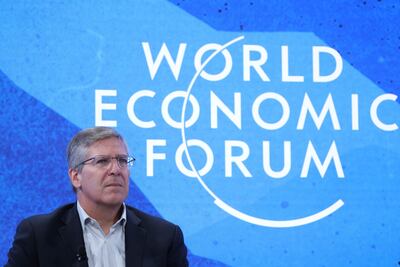Almost three-quarters (73 per cent) of the chief executives of the world's leading companies expect global economic growth to decline this year, according to the latest Global CEO Survey by PwC.
Revealed at the World Economic Forum's annual meeting Davos, the PwC survey is the gloomiest since the accountancy and business services firm began it more than 10 years ago.
In 2021 and 2022, more than 75 per cent the chief executives surveyed thought the global economy would improve.
Adapt or die
The survey of 4,410 chief executives in 105 countries also found that 39 per cent of bosses think that without significant changes to the current course of the businesses, they will no longer be viable within a decade.
"It is both the timeframe and magnitude that is surprising - how do I survive the next two to three years, and make my way through a challenging macroeconomic environment, while transforming my organisation to be fit for growth over the next 10 years," said Bob Moritz, global chairman of PwC.
Meanwhile, inflation, macroeconomic volatility and geopolitical concerns were foremost in chief executives' minds, prompting them to maximise revenues through cost cutting, price raising and diversification.
"A volatile economy, decades-high inflation, and geopolitical conflict have contributed to a level of CEO pessimism not seen in over a decade," Mr Moritz said.
The chief executives were concerned about the continuing viability of supply chains, the effects of the war in Ukraine, cyber security and expanding their offerings into new areas.

Worker power
However, 60 per cent of respondents said they had no intention of shrinking their workforces this year and the vast majority (80 per cent) said they would not be reducing workers' wages.
“Power remains with workers who have the right skills,” Mr Moritz said.
When asked about what was likely to affect the ability of their industry to make profits, about half cited changing customer tastes, regulatory changes, skills shortages and technology disruption. About 40 per cent said transitioning to a new energy source and supply issues.
"You're starting to see some differentiation, in terms of those (firms) that have a debt-driven balance sheet that will struggle while dealing with rising interest rates and inflationary pressures, versus those that have done a good job managing down debt and have the capacity to transform their portfolios," Mr Moritz said.
When it came to concerns over the global economy compared with their own national economies, business executives in France, Germany and the UK were less optimistic about domestic growth than global growth. That attitude was the opposite in the cases of the US, Brazil, India and China.
Reasons to be cheerful
But even though the CEO Survey was described as the most pessimistic for 10 years and that it tallied with a separate survey by the WEF showing two-thirds of business leaders expected a global recession in 2023, Mr Moritz said there are reasons to be cheerful.
"I do think you've got a world where the economic environment is much different than, for example, 2008-2009. That was a big shock to the system; everyone was concerned and that pessimisim was evident there. The degree of confidence that the CEOs can manage through that is much better now than it was in 2009," he said.
"Second, many of the things we're talking about are known. It's a question now of 'what do I do about them?' as opposed to trying to figure out the unknown ones."
"The third thing I would say which is a positive, is that the corporations and their c-suites and management teams are very much focused around this social impact and particularly around the employee base and the labour force — to have them consciously make decisions saying 'I don't want to do a large scale reduction' is much different than we've been in other recessions."






























